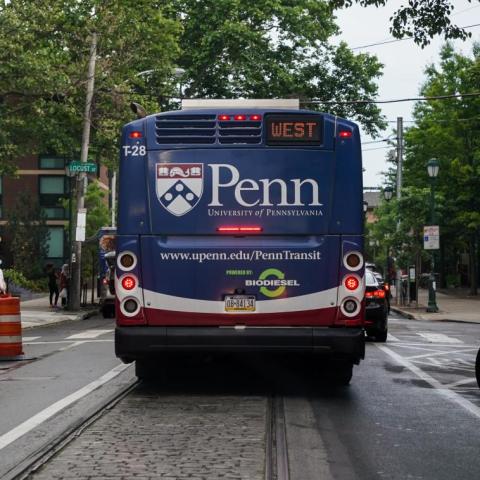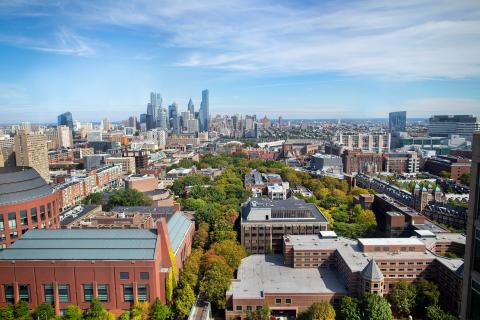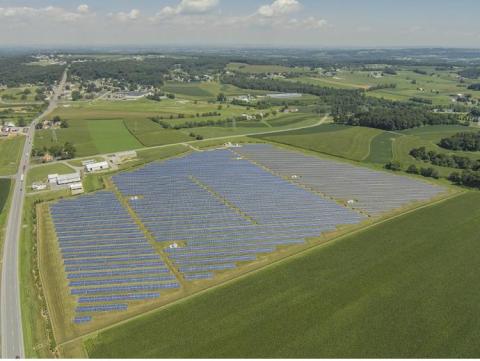
Climate & Sustainability Action Plan
With our commitment to advance the betterment of the human condition, combating climate change is a top priority at Penn. Through the Penn Sustainability Office and the goals outlined in the Climate and Sustainability Action Plan 4.0, our faculty, staff, and students are working collaboratively to secure a more sustainable future for our community—and the world.
Sustainability at Penn
Working collaboratively with our students, staff and faculty, Penn Sustainability aims to foster innovation, empower future leaders, and recognize advancements in University-wide social, environmental and economic change. As a commitment of the entire Penn community, Penn Sustainability serves as the central hub for our 12 schools, campus groups, and community members who oversee programs and policies working toward a sustainable, healthy, and vibrant campus.
With a long history of conscious green efforts, our commitment to sustainability can be traced back to key milestones. Penn is proud to have been the first Ivy League school to have the American College and University Presidents Climate Commitment (ACUPCC) signed by our President in 2007. We worked quickly to live up to this commitment, developing our first climate action plan in 2009.
As a globally renowned research University, it’s no secret that Penn’s sustainability initiatives are an integral part of our work for the global good. And as a student here, you’ll be able to jump right into the fight for a more sustainable future for all.
Climate and Sustainable Action Plan
Penn’s Climate and Sustainability Action Plan is our roadmap to a cleaner future.
Penn’s Climate and Sustainability Action Plan (4.0) unites our entire University community in a common mission to shift towards more sustainable practices and policies. The Climate & Sustainability Action Plan (CSAP) outlines our intent and action to mitigate climate impacts, adapt to emerging environmental conditions, and prepare our university—and our students—to lead in a rapidly evolving world. One such goal, a 100% carbon-neutral campus by 2042, is ambitious yet achievable through the many programs and initiatives led by Penn Sustainability.
The University's signing of the Presidents’ Climate Commitment in 2007 charged Penn to develop a strategic plan outlining the University’s goals for carbon reduction. Penn’s Climate Action Plan (CAP) was unveiled in 2009 and set the roadmap for Penn’s work toward environmental sustainability through efforts in seven areas: Academics, Utilities & Operations, Physical Environment, Waste & Recycling, Purchasing, Transportation, and Outreach & Engagement.
To stay current with technologies and climate challenges, our action plan is updated every five years with new goals, progress, and strategies. Today in its fourth iteration, the CSAP continues to outline our plan to combat climate change and adapt to environmental shifts for a more sustainable future.
Our Goals

Equip students and faculty to lead in climate solutions

Advance carbon neutrality through efficient, resilient infrastructure

Design and maintain sustainable, healthy campus spaces

Transform waste systems to support a circular economy

Promote low-carbon, accessible transportation for all

Collaborate with communities for just, shared climate progress
Since launching the first Climate Action Plan in 2009, Penn has seen significant progress, notably in student and faculty engagement. And with a new plan being released every five years, our goals and expectations continue to grow, mobilizing our community even further in our journey towards a cleaner and healthier future.
Our Progress

of schools and centers at Penn have set Academic Climate Commitments

Trees on campus, contributing to the beauty and balance of Penn’s ecological sustainability

of commuting trips made by Penn employees on average are by an alternative to single-occupancy vehicles

Year that Penn’s solar PPA was operational, generating approximately 420,000 MWh, roughly equivalent to 70% of the total electricity demand of the academic campus and the University of Pennsylvania Health System

reduction in building-related emissions as a result of on-campus conservation strategies plus a lower-carbon energy supply

waste diversion rate due to innovative purchasing and diversion strategies
